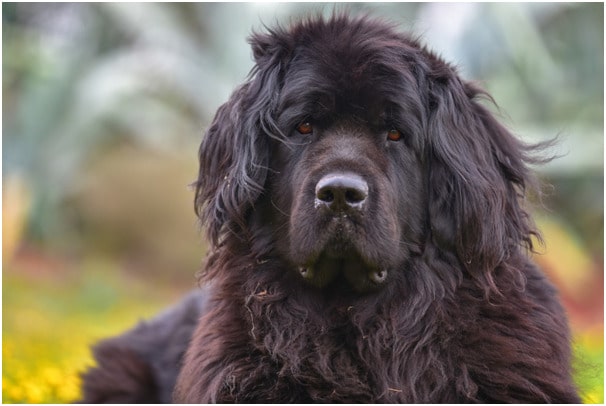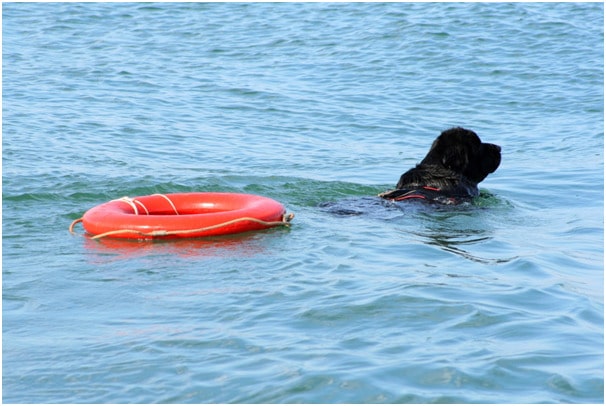While the Newfoundland breed is known for search and rescue work, many people wonder about their other abilities, including their sense of smell.
A Newfoundland has a great sense of smell with at least 100 million scent receptors, millions of times more than a human. Compared to other dogs, their sense of smell is average, but they are exceptional in their abilities to hunt and rescue on the water.
So, whether you are thinking about getting your own Newfie or checking out the capabilities of the one you already have, you’ll learn a lot about what they can and can’t smell by reading on. Dogs sense the world through their nose first and foremost, so you’d do well to know a bit about how it works!
One of a dog’s primary senses is its sense of smell.
We use vision as our primary sense, but this is not the case for all animals. For example, the way a thing smells gives tons of information to our dogs – much more than what it looks and sounds like.
Consider how dogs get to know each other when they first meet. First, they greet one another by smelling because it transfers a large amount of information to one another.
Their sense of smell is so good; that they are likely sensing a world that we can’t even imagine – just like we can’t imagine the 4th dimension or a new color. What they do smell is unbelievably rich compared to what we do.
What is a Newfoundland’s sense of smell?

While the Newfoundland is not a tracking dog, their sense of smell is relatively typical for a normal dog.
Human beings have 5-6 million scent receptors in their noses. Newfoundlands and most other dogs have around 100 million scent receptors, or more depending on the breed. The best tracker of all dog breeds, the bloodhound, is estimated to have 300 million.
In terms of what they can detect, think about how sensitive our eyes are to light. In a dark room, we can notice even a tiny pinprick of light. Similarly, Newfoundlands can detect certain smells that are only present in parts per trillion.
There is so much subtly in the odors they sniff; we can’t even imagine how deep and complex their world of smell goes. To make a comparison, when a well-trained human ear listens to an orchestra, they can often pick out the individual instruments and notes if they concentrate.
For your Newfie, smell likely comes to them like the sound of an orchestra comes to us. They can then distinguish different scents in their mind just like we can separate sounds when we listen.
When a dog smells another dog, they not only sense a dog’s odor, but like how we can guess a person’s age and gender by sight, they are learning the other dog’s age, gender, and health.
That’s what your dog is doing when they smell other dogs’ pee all over the neighborhood – getting updates on lots of information about those other dogs.
How does a Newfoundland use their nose?
Preventing your Newfoundland from sniffing is like putting on a blindfold when sending them out in the world. They use their nose for everything, giving them information and providing them with mental stimulation and exploration.
Your dog sniffing on a walk is similar to how we take in the scenery through sight. If you went on the same walk with your eyes closed, it would not be nearly as pleasant or stimulating.
Sometimes your Newfie will find a single tree or fire hydrant too interesting, and if they are taking a while, it’s ok to push them along with a “leave it” or tug on the leash.
On the other hand, if you are moving fast, make sure to stop every once in a while to let your dog get a good sniff and catch its bearings.
Beyond walks, there’s lots of scent play you can do to give your Newfie mental stimulation. For example, you can have them sniff around a yard or boxes for treats or even get them involved in a more official sport such as Scent work, where dogs search for different essential oils on cotton swaps.
Things that can affect your dog’s sense of smell
Lots of things can affect a dog’s sense of smell. For example, smoke has been found to dampen the ability of humans and rats to smell and is likely to affect dogs too.
There are also lots of medications that can affect a dog’s sense of smell. In particular, common steroids can hamper their ability to smell.
As for the common myths of swimming through water or letting heavy rain cover your scent – it turns out these things only confuse a tracking dog for a moment. They can find your scent again within minutes.
The importance of a Newfoundland’s sense of smell in everyday life

A dog’s olfactory area of the brain, dedicated to processing smells, is about 40 times larger than a human’s.
They are using that brain matter to learn everything they can about other dogs by sniffing them and places they’ve marked their territory.
Their sense of smell is also a huge source of mental stimulation, keeping them occupied on walks and at home.
Shockingly, your Newfoundland can also smell your emotions – including fear, anxiety, and sadness.
How much stronger is a Newfie’s nose than a human’s?
A human nose has about 400 scent receptors, whereas a Newfie’s has at least 100 million. The two are genuinely incomparable; as dogs experience a whole world of information, we only have the shallowest impression of it.
In terms of genes, dogs have 2.5 times more genes dedicated to their sense of smell than humans, which plays into their scent receptors and how much of their brain space is dedicated to processing their world of smells.
How far away can a Newfoundland smell its owner?
This depends on a variety of factors. Most importantly, are they tracking the trail of a scent, or are you coming towards them?
If they are following a trail, a Newfie can track their owner up to 10 miles. However, if you are merely in the area and approaching them, they can likely smell you from around a ¼ mile away.
However, tons of other environmental factors are at play, including the wind and wind direction, plus how much rain and bodies of water are involved.
A Newfoundland’s sense of smell can be used for rescue operations.

Yes, the sense of smell of a Newfoundland can be used to help rescue someone whose scent they know. Most likely, actual rescue dogs will be a breed with an overall better sense of smell, but it does mean when it comes right down to it that your Newfie could find you in the rubble.
Newfies can hunt fish underwater and locate people lost at sea.
One of a Newfie’s special traits comes from the breed’s history of working in and near water. They were used as fishing dogs from Newfoundland and could hunt fish underwater using their noses.
They are exceptionally good at waterwork and can help rescue a person while drowning or lost at sea.
Newfoundlands have been trained to sniff out drugs and bombs.
Dog’s noses are so good that they can be trained to sniff out drugs and bombs just by the smell. Newfoundlands themselves can be trained to do so. They are not a common drug or bomb dog, but they would work in a pinch.
Drug and bomb-sniffing dogs are not only prized for their noses. They have to be highly obedient and are usually trained to take down a suspect as well.
How does a Newfoundland’s sense of smell compare to humans and other animals?
Humans have a terrible sense of smell, with only 5-6 million scent receptors in our noses. This is minimal compared to a Newfoundland which has approximately 100 million. We also can only smell as we breathe, whereas dogs have a separation mechanism dedicated to sniffing.
As it turns out, African elephants have the best sense of smell among all animals. They have been known to detect water up to 12 miles away and have twice as many genes dedicated to their sense of smell as dogs do.
How to improve your Newfie’s sense of smell?
You can train a Newfoundland with scent play to improve its sense of smell. This involves helping them label and distinguish specific scents, and it’s how drug and bomb-sniffing dogs do their training.
The primary way drug-seeking dogs are trained, at least to start, is by wrapping drugs in their favorite toy and hiding it. Then, they will hunt down their favorite toy and associate the scent of the drugs with it over time.
Trainers will often reward them with treats whenever they find the toy, further training their noses.
Final thoughts
Overall, the sense of smell of a Newfoundland isn’t exceptional for a dog but is still excellent overall. They are especially good with waterwork and can help hunt fish and rescue people using their sense of smell on the water.
Like all dogs, they appreciate getting to sniff and explore during walks and are heavily stimulated but different scents.


